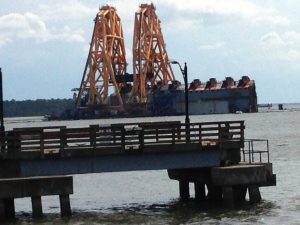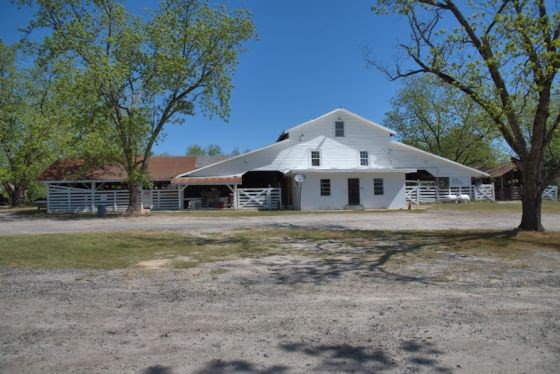GwinnettForum | Number 21. 36 | May 14, 2021
TRANSPORTATION OFFICIALS are seeking feedback about the extension of the existing Sugarloaf Parkway from Georgia Highway 316 to Interstate 85. The road is planned for mobility improvement between the northern (Buford/Sugar Hill/Suwanee area) and eastern (Dacula area) regions of Gwinnett County and to reduce traffic congestion created by commuter traffic during peak travel periods. Feedback on the proposed project is accepted until June 16, 2021. Comments will be considered as DOT develops the plans. Residents may leave comments at this site. Funding for the preliminary engineering and right-of-way acquisition come from Fiscal Year 2011 and 2014 programs. Construction financing, estimated at $195 million, has not been funded so far.
TODAY’S FOCUS: Bartow Morgan returns to banking with new acquisition
EEB PERSPECTIVE: Golden Ray salvage going slow near Georgia’s Golden Isles
ANOTHER VIEW: Evangelicals are stout in their support of Donald Trump
SPOTLIGHT: Renasant Bank
FEEDBACK: Reviewing facts on January 6 insurrection at the Capitol
UPCOMING: Gwinnettt, Gangnam district in Korea, agree to collaboration
NOTABLE: LAN Systems of Gwinnett sold to Durham’s WorkSmart
RECOMMENDED: Heaven and Hell, a History of the Afterlife by Bart D. Ehrman
GEORGIA TIDBIT: Augusta Canal of 1845 provided early power and transportation
MYSTERY PHOTO: Many may have driven by today’s Mystery Photo
LAGNIAPPE: La’Nece Strickland of Lawrenceville recognized for distinctive honor
Morgan returns to banking with new acquisition
By Scott Scredon
SANDY SPRINGS, Ga. | An investor group led by Bartow Morgan, Jr., has completed the acquisition of the Georgia Banking Company of Griffin and Sandy Springs, following the private placements of $125 million in common equity and $55 million in subordinated debt, it was announced today.
The company will use the proceeds raised from the equity and debt sales to help build a commercial and private banking franchise with the technology and breadth of products to serve middle market businesses across several key sub-markets in northern metro Atlanta. Commercial lending, including commercial real estate, will be paired with treasury management services. The bank plans to move its headquarters later this year from Sandy Springs to 1776 Peachtree Road in Atlanta.
Patriot Financial Partners was the lead institutional investor in the equity raise with FJ Capital Management as the second largest institutional investor. Both investors will have representatives serve on the company’s board of directors. Long-time Georgia banker Jim Lientz, a partner in Safe Harbor Consulting, will serve as chairman of the board.
 Morgan, who will serve as chief executive officer , says: “There is a need for an entrepreneurial community bank where the senior management team has established relationships throughout metro Atlanta and can provide a broad range of deposit and lending services, With the local economy’s projected growth, we see plenty of opportunities to reach small- and medium-size businesses that need a local lender.”
Morgan, who will serve as chief executive officer , says: “There is a need for an entrepreneurial community bank where the senior management team has established relationships throughout metro Atlanta and can provide a broad range of deposit and lending services, With the local economy’s projected growth, we see plenty of opportunities to reach small- and medium-size businesses that need a local lender.”
The acquisition completes Morgan’s return to banking in metro Atlanta. His great, great grandfather, E.M. Brand, founded Brand Bank in Gwinnett County in 1905, making Morgan the fifth-generation family member in the banking business. Brand Bank was sold to Renasant Corporation in 2018.
Georgia Banking Company, Inc., a banking holding company with approximately $652 million in assets, provides a variety of financial services.
Performance Trust Capital Partners served as exclusive financial adviser and sole placement agent for both the common equity and debt offerings. Troutman Pepper served as legal advisor.
- Have a comment? Send to: elliott@brack.net
Golden Ray salvage going slow near Georgia’s Golden Isles
By Elliott Brack
Editor and Publisher, GwinnettForum
MAY 14, 2021 | The continuing story coming out of the Golden Isles of Georgia is what’s taking place between St. Simons and Jekyll Island…..something being called the “Saga of the Golden Ray.” That’s the title of an informative article by Cathy Coleman in the spring issue of the local magazine, High Tide. We visited the Golden Isles last week and were mesmerized by the salvaging attempts.
![]() All this started on Sept. 8, 2019 when the auto carrier Golden Ray was departing the Georgia Ports Authority Brunswick vehicle terminal, headed back to sea, after 360 SUVs were driven on board, altogether hauling 4,200 vehicles. (Its capacity is 8,400 vehicles.)
All this started on Sept. 8, 2019 when the auto carrier Golden Ray was departing the Georgia Ports Authority Brunswick vehicle terminal, headed back to sea, after 360 SUVs were driven on board, altogether hauling 4,200 vehicles. (Its capacity is 8,400 vehicles.)
As Harbor Pilot Jonathan Tennant guided the ship under the Sidney Lanier bridge, and made a right turn into the sound between the two islands, something happened. The ship was oversteering to starboard. When he sought a correction, the ship was unresponsive. He radioed an incoming ship, saying ‘I’m losing her.” Almost immediately, the ship capsized.
As Coleman reports: “Amazingly, he (the pilot) was able to ground the ship on the sandbar just outside the (32 foot wide) shipping channel.” The pilot’s coolness and his grounding on the sandbar, instead of in the channel, earned him respect as a hero.
The pilot and 19 of the crew of 23 on the ship were soon rescued by the Coast Guard. Another four men trapped in the ship were eventually safe. No lives were lost.
The grounding happened 20 months ago, and still salvagers are trying to remove the ship from the sound. Meanwhile, after a few days delay, ships could still navigate through the shipping channel to offload cargo.
Salvaging the ship’s cargo and attempts to remove the ship from the channel have been slow. It also is expensive, $800 million at last reports, all paid by Korean shipping and insurance firms.
First some 6,000 tons of rock from Georgia quarries came to the site via trucks and barges, to surround the ship to slow tidal erosion of the sandy bottom. Another early step: removing 320,000 gallons of fuel mixed with sea water. Meanwhile, environmentalists daily check the nearby island beaches for damage, but have reported little so far.
Eventually, the mammoth Versabar 10,000 twin gantry catamaran, some 255 feet tall, with two massive yellow towers, came to the site to envelop the downed ship. It’s the largest lift vessel ever built in the states. It’s so big that even the largest cruise ships take up only half the vertical spacing. The crane’s winches and pulleys have been slowly sawing the ship’s hull into giant pieces, to float on barges to the Brunswick port, and eventually to Louisiana for scraping. The first section was the 3,100 metric ton bow, which took three weeks to saw. Other sections have taken longer. So far four of the seven sections have been moved to port.
The automobiles on the ship’s 13 decks when the ship rolled over, were then in vertical shafts, and fell to the bottom, damaged and stacked on one another. In port, giant derricks reach into the sections of the ship to snare car-by-car to load onto barges for scrap. This reduces the weight of the ship’s sections, making it easier and lighter to ship for scraping.
A good vantage point to watch the salvaging is from the St. Simons pier. The ship is about a mile and half away. But it is not a fast-moving operation, with little action, but only slow progress. It’s the talk of the islands, with salvaging going on for perhaps another one or two months.
- To see videos of this event, go to ssiresponse.com.
- Have a comment? Send to: elliott@brack.net
Evangelicals are stout in their support of Donald Trump
By Jack Bernard, contributing columnist
“Learn to do right; seek justice. Defend the oppressed. Take up the cause of the fatherless; plead the case of the widow.”– Isaiah 1:17
PEACHTREE CITY, Ga. | In an ideal world, the leader that Protestant Americans most admire would be someone that they can look up to. Someone that they can want their children to aspire to be like. Someone who defends the oppressed, like in the Bible quote above. But we all know that our world is not an ideal world. It has many flaws and contradictions.
 People can argue in good faith about individual President Trump era policies. But given his lack of basic morality, it is hard to defend Trump as a person, or to justify the abysmal way that he handled the presidency from day one, cynically dividing the nation into feuding tribes. He was the opposite of everything stated and implied in the Biblical quote.
People can argue in good faith about individual President Trump era policies. But given his lack of basic morality, it is hard to defend Trump as a person, or to justify the abysmal way that he handled the presidency from day one, cynically dividing the nation into feuding tribes. He was the opposite of everything stated and implied in the Biblical quote.
However, in April 2017, white evangelical Protestants strongly supported Trump with 71 percent approving of his performance. Even among white non-evangelical Protestants, the number was 52 percent, still a majority. (Pew Research.)
You may or may not like President Biden’s policies, but it is hard to say that you disapprove of him as a person or the way he is handling his job at this early stage of his term. However, in April 2021, only 23 percent of white Protestant evangelicals approved of his job performance. The figure was only 45 percent for white Protestant non-evangelicals.
For the religiously unaffiliated, including agnostics/atheists/ nothing in particular, the figures were essentially reversed. In April 2017, only 24 percent approved of Trump’s performance. Whereas, in April 2021, 71 percent of the unaffiliated approved of Biden’s performance.
It should be noted that I’ve noticed similar discrepancies before when examining religion and a specific issue, like gun violence. For example, the rates of firearm deaths are the greatest in the following states: Alaska, Mississippi, Wyoming, New Mexico, Alabama, Louisiana, Missouri, South Carolina, Arkansas, Montana, Oklahoma, and Tennessee. (CDC).
Interestingly, five of these states are the five most religious states and the other five are all considerably more religious than the average state. And all of these states are solidly red states, except New Mexico, which leans blue.
So, where does this leave us regarding religious Protestants and politics? Frankly, with more questions than answers.
Ex-President Trump continues to exert tremendous influence on the Republican Party, with anyone who opposes him (for example, solidly conservative Liz Cheney) being drummed out of leadership positions regardless of their ideological political positions. But why do white Protestants (and evangelicals in particular) still support Trump, even though he is immoral and frequently lies? How do they justify doing this when they say that they follow the teachings of the Bible?
Are evangelicals brainwashed by FOX, Breitbart and the other “fake news” outlets promoting right wing conspiracies? Do they just ignore traditional mainstream media and facts?
Or is it something else that permits them to ignore their religious teachings and support Trump rather than Biden?
- Have a comment? Send to: elliott@brack.net
Renasant Bank
 The public spiritedness of our sponsors allows us to bring GwinnettForum.com to you at no cost to readers. Today’s sponsor is Renasant Bank, which has humble roots, starting in 1904 as a $100,000 bank in a Lee County, Miss. bakery. Since then, we have grown to become one of the Southeast’s strongest financial institutions with approximately $14.9 billion in assets, approximately 2,600 associates, and more than 200 banking, lending, wealth management and financial services offices in Mississippi, Alabama, Tennessee, Georgia and Florida. All of Renasant’s success stems from each of our banker’s commitment to investing in their communities as a way of better understanding the people we serve. At Renasant Bank, we understand you because we work and live alongside you every day.
The public spiritedness of our sponsors allows us to bring GwinnettForum.com to you at no cost to readers. Today’s sponsor is Renasant Bank, which has humble roots, starting in 1904 as a $100,000 bank in a Lee County, Miss. bakery. Since then, we have grown to become one of the Southeast’s strongest financial institutions with approximately $14.9 billion in assets, approximately 2,600 associates, and more than 200 banking, lending, wealth management and financial services offices in Mississippi, Alabama, Tennessee, Georgia and Florida. All of Renasant’s success stems from each of our banker’s commitment to investing in their communities as a way of better understanding the people we serve. At Renasant Bank, we understand you because we work and live alongside you every day.
- For more details, go to www.renasantbank.com
- For a list of other sponsors of this forum, click here.
Reviewing facts on Jan. 6 insurrection at the Capitol
Editor, the Forum:
![]() Let’s review a few facts about January 6 at the National Capitol.
Let’s review a few facts about January 6 at the National Capitol.
- Thousands marched on the Capitol, many from Ex-President Trump’s Stop-the-Steal rally.
- Hundreds of those people swarmed into restricted areas and broke into the Capitol.
- Some of these people assaulted Capitol Police officers trying to protect those in the building, damaged property, read material left behind when the Members of Congress fled the chamber and brandished weapons like flag poles, stolen police shields, and pepper and bear sprays.
- Over 440 of these intruders have been arrested, and authorities are seeking to identify and arrest others who appear in videos and photos committing violent, illegal acts.
What do Republicans in Congress and the so-called conservative media have to say about these facts? Some say it wasn’t Trump supporters who first entered the Capitol, but Antifa and Black Lives Matter. The Trump supporters were protesting peacefully. Then they say “Maybe some did go into the Capitol, but the police let them in. It wasn’t that big of a deal. Let’s just move on.”
Let’s not just move on. January 6 was a big deal. The 2020 presidential election could have been overthrown, enabled by a violent mob and members of Congress willing to accept assertions of widespread election fraud, regardless of the vote certifications by state election officials. Had that overthrow occurred, America would have had a coup or at least an attempted coup…if it hasn’t already had an attempted coup.
— Michael Wood, Peachtree Corners
Gives background on Norfolk Southern in N.C.
Editor, the Forum:
A friend of mine made me aware of your article this week on Samuel Spencer. As a 70 year old, I enjoyed reading it. My family dating back to my Great-grandparents all worked for the Southern Railroad, as does my son now.
The Spencer Yard was located in the Town of Spencer, and the Town of East Spencer, Rowan County, N.C. The rail tracks where the yard was, split the two towns. Spencer yard was a part of Spencer Shops, a locomotive and later a diesel repair facility. Southern Railroad chose Spencer for the facility because it was the halfway point between Washington and Atlanta.
In the early 60s the Spencer Shops and Yard operations permanently closed. The yard operations were moved to Linwood, in Davidson County, N.C. The Linwood facility, a “hump yard”, was then named Spencer Yard, then the NS’s newest technology. Operations at Spencer Yard in Linwood, an up-to-date facility, ceased last year. NS displaced and relocated many workers, including my son. His seniority placed him at Seven Mile Yard in Charleston, S.C.
NS relocated its Yard operations in Linwood back to Spencer and Salisbury. It makes you think that NS makes knee jerk decisions. By the way, the old Spencer Shops is now the N. C. Transportation Museum. The museum in Spencer would be an appropriate place for the Samuel Spencer statue.
— Jim Gobbel, Spencer, N. C.
Locke wrote of civilized societies in the 1600s; today?
Editor, the Forum:
In the late 1600s, John Locke wrote about a civilized society.
Today the question is: with citizens and police killing citizens daily throughout our nation, do we in 2021 live in a civilized society here in the good old U. S. of A?
— Ashley Herndon, Oceanside, Calif.
Send us your thoughts: We encourage you to send us your letters and thoughts on issues raised in GwinnettForum. Please limit comments to 300 words, and include your hometown. We reserve the right to edit for clarity and length. Send feedback and letters to: elliott@brack.net
Gwinnettt, Gangnam district in Korea to collabore
The Gwinnett Chamber of Commerce and Gangnam District in Seoul, South Korea, have agreed to deepen an 11-year partnership during a virtual ceremony on Tuesday, May 11. This Memorandum of Understanding (MOU) is meant to encourage collaboration between the two parties with a focus on trade, culture, and tourism.
Gwinnett Chamber Board Chair Doug Jenkins says: “Being one of Georgia’s top five foreign direct investments, South Korea is invaluable to Georgia’s strong economic growth. Building on the 11-year sister-community agreement between the county and Gangnam, we look forward to collaborating with each other in trade, culture, and economic development.”
In addition to continuing business and delegation visits, the Gwinnett Chamber and Gangnam District hope to further collaborate through virtual webinars and forums. There are 14 Korean businesses located in Gwinnett, according to Business Wise Inc. of Atlanta.
Gangnam Mayor Soon-Kyun Jung, during part of the ceremony, said: “I am very delighted to meet Chairwoman Nicole Hendrickson, Board Chair Doug Jenkins, President and CEO Nick Masino, as well as all the officials joining us for today’s virtual MOU signing ceremony. Although it’s a difficult time for everyone due to COVID-19, I hope today’s ceremony will lead to more exchanges with the Gwinnett Chamber in many areas, including but not limited to, healthcare and IT solutions.”
Nick Masino, president and CEO of the Gwinnett Chamber and Partnership Gwinnett, responded: “As the Gwinnett Chamber signed memorandums of understanding with bi-lateral chambers in the metro
Atlanta area this past year, we are excited to formalize our first partnership with the Gangnam District in Seoul, South Korea.
Alongside Mayor Jung, in attendance from the Gangnam District office were Geon-Heyong Cho, cultural affairs specialist; Hi-Joo Kim, director of New Design Bureau; and Gwang-Soo Kim, tourism promotion division. Gwinnett County Chairwoman Nicole Love Hendrickson and Robert Rapson, Acting US Ambassador to South Korea, provided video messages congratulating both parties on the agreement.
- To read the Memorandum of Understanding, click here.
Two new businesses will make their home in Gwinnett
Two new businesses now call Gwinnett home.
Republic Elite announces its corporate expansion in Gwinnett County. The announcement represents 125 jobs created in the community.
Republic Elite, Texas-based cabinet manufacturer and interiors solutions provider, has acquired the assets of Windsor Kitchen and Bath of Lawrenceville. The acquisition will increase Republic Elite’s capacity by 40 percent and cabinets manufactured by 315,000 through utilization of 100,000 sq. ft. of existing factory space and equipment..
The acquisition of Windsor will also incorporate the latest manufacturing principles – digital factory, connected machinery, robust lean manufacturing processes – to enable predictive quality and maintenance, and allow data-driven decisions to be made on the shop floor in real time.
Republic Elite’s Chief Business Officer Adam Sumrow adds: “Our growth east is fueled by demand, which is why this acquisition is such a critical building block for us. Through this presence in Georgia, we aim to reduce our carbon footprint, our freight costs and expand our melamine collections to new clients.
Epi Breads is moving its corporate headquarters to Peachtree Corners. The announcement represents 300 jobs and $15M in capital investment for the community.
The company is moving their bakery and corporate offices to a 176,000 square foot facility located in unincorporated Gwinnett County at 2650 Button Gwinnett Drive and is poised to expand product offerings and customer base.
EPI Breads started in 1985 as a small Atlanta bakery delivering “ultra” fresh breads to local establishments. It was once located in Atlanta on Tullie Circle. Today EPI Bread develops a diverse variety of custom breads across foodservice and retail. It has another bakery in Muskegon, Mich., and ships to all 50 states.
Epi Breads is a bakery delivering custom breads across foodservice and retail industries both locally and nationally. They provide a variety of breads ranging from sub rolls to artisan breads.
Cheryl Barre, CEO of Epi Breads, says: “Our first headquarters and bakery opened in Atlanta over 35 years ago. As our business has grown, we chose to relocate and expand to Gwinnett County, so we could meet the needs of our customers by providing unique artisan-style breads.”
School zone cameras approved for unincorporated Gwinnett
School zone cameras, adopted by some Gwinnett cities, may soon come to schools throughout Gwinnett. Gwinnett Commissioners have adopted a resolution to allow the use of speed cameras in school zones in unincorporated Gwinnett County.
Using research conducted by Gwinnett Police on measures to improve safety around schools, commissioners voted to allow recording devices and associated fines as provided in state law. Warnings will be issued initially until drivers get accustomed to the new procedures.
Gwinnett Police will now recommend specific areas where camera enforcement is most needed. Gwinnett Deputy Police Chief J.D. McClure says: “This will also allow us to dedicate more time to priority calls and other patrol functions.”
LAN Systems of Gwinnett sold to Durham’s WorkSmart
LAN Systems of Berkeley Lake, a full-service IT solutions provider, has been sold to WorkSmart of Durham, N.C. The sale was concluded March 1.
LAN Systems has 13 employees that will remain with the firm. At the same time, WorkSmart has announced that it was also buying another IT company in Atlanta, RMS of Atlanta, with five employees. The company will end with 102 overall employees. Worksmart provides IT services , cybersecurity, IT strategy and planning, data backup and cloud services.
Clay Harris, president of WorkSmart, says: “With LAN’s focus on creating strong client partnerships and demonstrated technical expertise, we’re excited to join forces in helping our clients and team members reach their full potential – and to remain the best option for managed IT services for small businesses in Atlanta.”
WorkSmart was founded in 2001 in North Carolina. It also has offices in Charlotte, Greensboro, Philadelphia, the NY metro area, and now Atlanta.
Mary Hester of Duluth, the owner of LAN Services, says of the sale: “When I looked at options, it was important to find a company that would take care of the employees and clients with the same focus and integrity. I know that I found the right fit with WorkSmart.”
Meet the WorkSmart team and learn more about them at:www.worksmart.com/about.
Allen is new director of sales at Corporate Environments
Corporate Environments welcomes Chip Allen as director of sales. He has over 20 years of experience in the office interiors industry, flooring industry and business development. Allen is a graduate of Kennesaw State University where he earned a BBA with a focus in marketing. He is active in Satisfeed, a community meals program, as well working with Junior Achievement and MUST Ministries. He and his wife and three children live in Suwanee.
Heaven and Hell, a History of the Afterlife by Bart D. Ehrman
![]() From Raleigh Perry, Buford: Bart Ehrman is one of my favorite authors; he makes me think. He has written a ton of books which, in my case, make me think. He started his life as a Lutheran, went to undergraduate college at Wheaton, then got his doctorate in theology at Princeton and started in the ministry. He gave up on the fundamentalism. Somewhere along the line he thought the ministry was not for him. He is both a historian and a polyglot. He causes me to rethink certain scriptures that I have questioned. Some people can accept what he says and others just don’t want to hear about him. This book is on a history of the afterlife. The book will jiggle your brain. It makes you think. I question everything and consider the most important punctuation in any language to be the Question Mark. He is an incredible writer.
From Raleigh Perry, Buford: Bart Ehrman is one of my favorite authors; he makes me think. He has written a ton of books which, in my case, make me think. He started his life as a Lutheran, went to undergraduate college at Wheaton, then got his doctorate in theology at Princeton and started in the ministry. He gave up on the fundamentalism. Somewhere along the line he thought the ministry was not for him. He is both a historian and a polyglot. He causes me to rethink certain scriptures that I have questioned. Some people can accept what he says and others just don’t want to hear about him. This book is on a history of the afterlife. The book will jiggle your brain. It makes you think. I question everything and consider the most important punctuation in any language to be the Question Mark. He is an incredible writer.
- An invitation: what books, restaurants, movies or web sites have you enjoyed recently? Send us your recent selection, along with a short paragraph (150 words) as to why you liked this, plus what you plan to visit or read next. Send to: elliott@brack.net
Augusta Canal of 1845 provided power, transportation
The Augusta Canal, constructed in 1845, provides water to the city, power to factories, and transportation for canal craft. The canal rescued Augusta from a business depression in the 1840s and provided energy for war-related industries during the Civil War (1861-65). In the 1880s, it fueled an economic boom and then experienced neglect during the mid-1900s. The canal later benefited from a groundswell of popular support in the 1990s.
 The city of Augusta, situated at the Savannah River‘s head of navigation, had served as an entrepôt between land and river traffic since its founding in 1736. However, because of a national depression and the western migration of many of its citizens, Augusta needed a resource other than commerce. Henry Cumming, son of the city’s first mayor, Thomas Cumming, took the initiative in a bold enterprise—the construction of a seven-mile canal from above the Savannah River rapids into the heart of Augusta.
The city of Augusta, situated at the Savannah River‘s head of navigation, had served as an entrepôt between land and river traffic since its founding in 1736. However, because of a national depression and the western migration of many of its citizens, Augusta needed a resource other than commerce. Henry Cumming, son of the city’s first mayor, Thomas Cumming, took the initiative in a bold enterprise—the construction of a seven-mile canal from above the Savannah River rapids into the heart of Augusta.
In November 1844, at his own expense, Cumming engaged John Edgar Thomson, chief engineer of the unfinished Georgia Railroad, to survey the route of the waterway and draw up plans. Thomson’s prestige provided credibility for the project.
Cumming credited William D’Antignac with proposing a creative scheme for financing the canal. Four banks agreed to put up $1,000 each as seed money. The city of Augusta issued bonds worth $100,000 to be redeemed by a “canal tax” levied on the value of property. Citizens received stock, or “canal scrip,” in proportion to the taxes they paid and voted for a board of managers. The city continued to contribute to the cost and became the largest stockholder. The city council named a special Canal Board of Commissioners to build the canal, and Cumming served as president of the canal board. The canal’s only paid employee, William Phillips, spent 23 years as secretary to the board and as chief engineer.
In May 1845 work began on 12 sections simultaneously. After digging began, the canal board made a controversial move and changed the outlet from east of Augusta to a point west of Augusta.
By September 1845, 200 men were working on the first level. On November 23, 1846, the headgates opened for the first time and flooded the first level. In January 1847 the canal board hired Jabez Smith of Petersburg, Va., to supervise construction of the huge Augusta Factory at the terminus of the first level. James Coleman’s saw and gristmill began operations on the canal in April 1848, becoming the first industry to do so. In May the Augusta Factory began the production of textiles.
During the next two years the canal board extended the second level five city blocks and built a third level that carried the water back to the river. Smaller shops opened for business on the second and third levels. The wooden aqueduct over Rae’s Creek on the first level proved troublesome, so the canal board replaced it with a stone structure in 1853. His work done, Cumming resigned with the gratitude of the city, as Augusta began its industrial expansion. William Phillips became chief engineer, and his major contribution was a modern waterworks system, completed in 1861, that replaced conduits of hollowed-out logs.
The recreational use of the canal today complements its traditional functions of providing water power to industry and drinking water to the public.
- To view the Georgia Encyclopedia article online, go to http://georgiaencyclopedia.org
Many may have driven by today’s Mystery Photo
Some of you probably have passed by today’s Mystery Photo, a simple photo that has a story behind it. Figure out where this is, and then send your answer to elliott@brack.net to include your hometown.
 One of Georgia’s natural wonders was the Mystery Photo last week, and only three readers recognized it.
One of Georgia’s natural wonders was the Mystery Photo last week, and only three readers recognized it.
It was Tallulah Falls, from a photo sent to us by Ann Royster of Shelby, N.C., via Susan McBrayer of Sugar Hill. First in with the answer was Kelly Herndon, who had just camped at the park. George Graf, Palmyra, Va., and Allen Peel of San Antonio, Tex. also got the right answer.
 Peel wrote: ‘Today’s mystery photo is a view of the L’Eau d’Or Falls, one of five natural waterfalls that are collectively referred to as the Tallulah Falls along the Tallulah River within Tallulah Gorge State Park. The L’Eau d’Or Falls are the first of the waterfalls that form downstream from the hydroelectric dam that created Tallulah Falls Lake. The dam was built in 1913 by Georgia Railway and Power (now Georgia Power) in order to provide the power to run the streetcars in Atlanta, almost 100-miles to the southwest of the dam. The falls were originally called the Hawthorne Cascade, named after Reverend Benjamin Hugh Hawthorne (1806-1937), an Irish Priest who lived in the area and drowned in the pool below the falls on July 11, 1837. After his death, the pool below the cascading waterfall was called Hawthorne’s Pool, which still bears his name today.”
Peel wrote: ‘Today’s mystery photo is a view of the L’Eau d’Or Falls, one of five natural waterfalls that are collectively referred to as the Tallulah Falls along the Tallulah River within Tallulah Gorge State Park. The L’Eau d’Or Falls are the first of the waterfalls that form downstream from the hydroelectric dam that created Tallulah Falls Lake. The dam was built in 1913 by Georgia Railway and Power (now Georgia Power) in order to provide the power to run the streetcars in Atlanta, almost 100-miles to the southwest of the dam. The falls were originally called the Hawthorne Cascade, named after Reverend Benjamin Hugh Hawthorne (1806-1937), an Irish Priest who lived in the area and drowned in the pool below the falls on July 11, 1837. After his death, the pool below the cascading waterfall was called Hawthorne’s Pool, which still bears his name today.”
Lots of steps: Kelly, Stacy and Kathleen Patterson of Lawrenceville (above, right) enjoyed camping at Tallulah Falls State Park during spring Kelly says: “I strongly encourage all not to miss what is in our own backyard. Our group traversed 750 steps to the swinging bridge plus 450 steps to the bottom, followed by a climb to the South Rim and hike to see Wallenda’s Tower. I huffed and puffed but it was doable and worth it. My watch said we hiked 35 stories.”
High Recognition: A 24-year-old new summa cum laude graduate of Georgia Gwinnett College, La’Nece Strickland of Lawrenceville, has been recognized by the Georgia Legislature and the Board of Regents for her academic achievement. She was part of the Academic Recognition Day, as she earned a bachelor’s of science degree in criminal justice.
- Have a comment? Send to: elliott@brack.net
GwinnettForum is provided to you at no charge every Tuesday and Friday.
Meet our team
- Editor and publisher: Elliott Brack, 770-840-1003
- Managing editor: Betsy Brack
- Roving photographer: Frank Sharp
- Contributing columnist: Jack Bernard
- Contributing columnist: Debra Houston
- Contributing columnist: George Wilson
More
- Location: We are located in Suite 225, 40 Technology Park, Peachtree Corners, Ga. 30092.
- Work with us: If you would like to serve as an underwriter, click here to learn more.
Subscriptions to GwinnettForum are free.
- Click to subscribe.
- Unsubscribe. We hope you’ll keep receiving the great news and information from GwinnettForum, but if you need to unsubscribe, go to this page and unsubscribe in the appropriate box.
© 2021, Gwinnett Forum.com. Gwinnett Forum is an online community commentary for exploring pragmatic and sensible social, political and economic approaches to improve life in Gwinnett County, Ga. USA.



















Follow Us